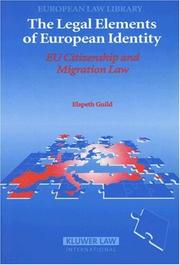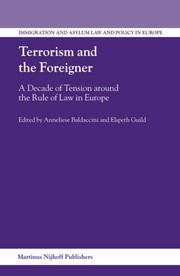| Listing 1 - 6 of 6 |
Sort by
|
Book
ISBN: 1282398164 9786612398162 9004180745 9789004180741 9004165541 9789004165540 9789004165540 9781282398160 6612398167 Year: 2009 Publisher: Leiden Boston Martinus Nijhoff Publishers
Abstract | Keywords | Export | Availability | Bookmark
 Loading...
Loading...Choose an application
- Reference Manager
- EndNote
- RefWorks (Direct export to RefWorks)
Offering the first comprehensive analysis of readmission agreements, this book examines the intersection of immigration and human rights law and the complex interplay between evolving international, regional and national norms. Expanding the current academic and policy discourse on readmission agreements through detailed consideration of the negotiation processes carried out by the European Community, it renders a nuanced review of the underlying strategic objectives and regional effects of these treaties. The book makes a robust challenge to prevailing perspectives in legal scholarship and policy on readmission and refugee protection. The self-contained focus on EC readmission agreements throws light on broader questions of EU migration policy and reveals a detailed and insightful picture of a specific field of EU policy and action.
Noncitizens --- Deportation --- Emigration and immigration law --- Undocumented immigrants --- Expulsion --- Asylum, Right of --- Extradition --- Refoulement --- Law and legislation --- Illegal aliens --- Aliens --- Aliens, Illegal --- Illegal immigrants --- Illegal immigration --- Undocumented aliens --- Alien detention centers --- Human smuggling --- Legal status, laws, etc. --- Enemy aliens --- Expatriates --- Foreign citizens (Aliens) --- Foreign population --- Foreign residents --- Foreigners --- Resident aliens --- Unnaturalized foreign residents --- Persons --- Deportees --- Exiles --- Immigrants --- Refugees --- Non-citizens --- Unauthorized immigrants --- Illegal immigration. --- Children of illegal aliens --- Illegal alien children --- Irregular migration --- Unauthorized immigration --- Undocumented immigration --- Women illegal aliens --- Emigration and immigration --- Noncitizen detention centers --- Emigration and immigration law - European Union countries --- Illegal aliens - European Union countries --- Deportation - European Union countries --- Aliens - European Union countries
Book
ISBN: 9789462403239 9789462403406 9462403236 Year: 2016 Publisher: Oisterwijk: Wolf Legal Publishers,
Abstract | Keywords | Export | Availability | Bookmark
 Loading...
Loading...Choose an application
- Reference Manager
- EndNote
- RefWorks (Direct export to RefWorks)
In the European Union the Return Directive aims at establishing common standards and procedures to be applied in Member States for returning illegally staying third-country nationals. An entry ban prohibits entry into and stay on the territory of all EU Member States (except the United Kingdom and Ireland) and Switzerland, Norway, Iceland and Liechtenstein. This instrument is intended to have preventive effects and to foster the credibility of EU return policy. The clear message is that those who disregard migration rules in the Member States will not be allowed to re-enter any Member State for a specified period. Furthermore, the entry ban is an instrument which can be used to prevent or to counter terrorism. The use of criminal sanctions in the area of immigration opens the largely political debate on the legitimacy of the process of criminalizing foreigners. The merger between criminal law and immigration law has been classified as "crimmigration law". The entry ban falls within the scope of crimmigration law. The relation between immigration law and criminal law and the compatibility of national penal measures imposed as a punishment for illegal migration is developed in the case law of the Court of Justice of the European Union. There is a well-established jurisprudence on the interplay between domestic penal sanctions and the effectiveness of return policy. The effectiveness of the return process would be compromised by the application of a criminal penalty for violating the entry ban, because the primary objective of the Directive is not to prevent illegal presence in the territory but rather to put an end to it. The current issue is to determine to what extent the use of criminal sanctions by Member States is allowed in the situation that an entry ban is issued against an illegally staying third-country national. This research focuses on this issue.
Emigration and immigration law --- Illegal aliens --- Detention of persons --- Deportation --- Government policy --- Europe --- Emigration and immigration law - Government policy - European Union countries --- Illegal aliens - European Union countries --- Detention of persons - European Union countries --- Deportation - European Union countries --- Europe - European Union countries

ISBN: 9041123040 9789041123046 Year: 2004 Volume: 1 Publisher: The Hague: Kluwer law international,
Abstract | Keywords | Export | Availability | Bookmark
 Loading...
Loading...Choose an application
- Reference Manager
- EndNote
- RefWorks (Direct export to RefWorks)
Migration. Refugees --- Law of nations: objects and subjects --- European law --- Citizenship --- Emigration and immigration law --- Aliens --- Citoyenneté --- Emigration et immigration --- Etrangers --- Droit --- Europese Unie --- immigratie --- mensenrechten --- politieke organisaties, internationaal --- recht, internationaal --- rechtsbescherming --- Citoyenneté --- Noncitizens --- Enemy aliens --- Expatriates --- Foreign population --- Foreign residents --- Foreigners --- Illegal aliens --- Illegal immigrants --- Non-citizens --- Resident aliens --- Unauthorized immigrants --- Undocumented aliens --- Undocumented immigrants --- Unnaturalized foreign residents --- Persons --- Legal status, laws, etc. --- Citizenship - European Union countries --- Emigration and immigration law - European Union countries --- Aliens - European Union countries

ISBN: 9004151877 9789004151871 9786612396793 128239679X 9047409841 9789047409847 6612396792 Year: 2007 Volume: v. 11 Publisher: Leiden: Nijhoff,
Abstract | Keywords | Export | Availability | Bookmark
 Loading...
Loading...Choose an application
- Reference Manager
- EndNote
- RefWorks (Direct export to RefWorks)
This volume traces the developments in the laws and practices of the European Union and five of its Member States (the United Kingdom, Germany, France, the Netherlands, and Italy) at two points in time: first at the time of the Gulf War following Iraq’s invasion of Kuwait in August 2000; secondly, following the terrorist attacks in the United States on 11 September 2001. The focus is on the legal status of immigrants and asylum seekers and how that legal status is being modified on grounds of security-related measures adopted over a period of about ten years. Particularly, the question is whether and how far situations have come into existence, which could be considered to be in conflict with fundamental principles of human rights.
Human rights --- European law --- International private law --- Terrorism --- Emigration and immigration law --- Aliens --- Prevention --- Noncitizens --- Acts of terrorism --- Attacks, Terrorist --- Global terrorism --- International terrorism --- Political terrorism --- Terror attacks --- Terrorist acts --- Terrorist attacks --- World terrorism --- Direct action --- Insurgency --- Political crimes and offenses --- Subversive activities --- Political violence --- Terror --- Prevention. --- Terrorism - European Union countries --- Terrorism - European Union countries - Prevention --- Emigration and immigration law - European Union countries --- Aliens - European Union countries --- Human rights - European Union countries
Book
ISBN: 9789004265240 9004265244 9004265252 9789004265257 Year: 2014 Volume: 34 Publisher: Leiden: Brill,
Abstract | Keywords | Export | Availability | Bookmark
 Loading...
Loading...Choose an application
- Reference Manager
- EndNote
- RefWorks (Direct export to RefWorks)
In recent years the EU has been active in developing a common European immigration policy in cooperation with third countries and in building an “external dimension” of such an EU policy. The linkages between the EU’s external relations and migration policies have influenced the distinct legal positions of third-country nationals (non-EU nationals). This book critically discusses whether the EU’s objective of creating a common EU migration policy can be achieved against the backdrop of a highly fragmented EU framework for migration law and policy, and it argues that it is difficult to speak of one single, unitary group of third-country nationals forming the counterpart to EU citizens.
Emigration and immigration law --- Aliens --- Non-European Union aliens. --- International travel regulations --- Freedom of movement --- Circulation internationale des personnes --- Libre circulation des personnes --- Emigration et immigration --- Etrangers --- Droit --- Noncitizens --- Enemy aliens --- Expatriates --- Foreign citizens (Aliens) --- Foreign population --- Foreign residents --- Foreigners --- Resident aliens --- Unnaturalized foreign residents --- Persons --- Deportees --- Exiles --- Immigrants --- Refugees --- Legal status, laws, etc. --- Illegal aliens --- Illegal immigrants --- Non-citizens --- Unauthorized immigrants --- Undocumented aliens --- Undocumented immigrants --- Non-European Union aliens --- Emigration and immigration law - European Union countries --- Aliens - European Union countries --- Non-European Union noncitizens
Book
ISBN: 1282786962 9786612786969 9004189548 9789004189546 9789004184077 9004184074 9781282786967 Year: 2010 Publisher: Leiden ; Boston : Martinus Nijhoff Publishers,
Abstract | Keywords | Export | Availability | Bookmark
 Loading...
Loading...Choose an application
- Reference Manager
- EndNote
- RefWorks (Direct export to RefWorks)
This book provides an analysis of the current state of affairs in EU migration law. Five Directives on legal migration and national legislation in five Member States are critically assessed in terms of compliance with EU principles of law and international human rights.
Freedom of movement --- Migrant labor --- Free choice of employment --- Aliens --- Emigration and immigration law --- Labor, Migrant --- Migrant workers --- Migrants (Migrant labor) --- Migratory workers --- Transient labor --- Employees --- Casual labor --- Legal status, laws, etc. --- Noncitizens --- Enemy aliens --- Expatriates --- Foreign citizens (Aliens) --- Foreign population --- Foreign residents --- Foreigners --- Resident aliens --- Unnaturalized foreign residents --- Persons --- Deportees --- Exiles --- Immigrants --- Refugees --- Illegal aliens --- Illegal immigrants --- Non-citizens --- Unauthorized immigrants --- Undocumented aliens --- Undocumented immigrants --- Freedom of movement - European Union countries --- Migrant labor - Legal status, laws, etc - European Union countries --- Free choice of employment - European Union countries --- Aliens - European Union countries --- Emigration and immigration law - European Union countries
| Listing 1 - 6 of 6 |
Sort by
|

 Search
Search Feedback
Feedback About UniCat
About UniCat  Help
Help News
News